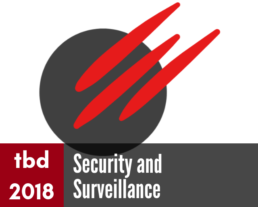Big Data Governance Beyond Personal Data
Big Data Governance Beyond Personal Data
The echo of the new GPDR gives the impression that the legal issues about big data will concentrate on personal data. The approach is mainly due to the acknowledged importance of the EUCFR, article 8, which suggests and consolidates this idea of data governance.
Big data, however, impact other different domains, going beyond personal data. This perspective, therefore, risks being misleading and neglects other relevant aspects.
Data, indeed, have significant legal interests for different reasons (e.g. openness and transparency of government or secrecy for security or commercial purposes) and their informational and computational power may affect further relevant fundamental rights.
The lecture aims to analyze this broader scenario, considering these other themes historically related to data protection (e.g. copyrights and trade secrets; database establishment; public/private re-use of information; intelligence issues; non-personal data regulation).
The final objective is to offer a more clear and comprehensive understanding of the current state of the art, highlighting the possible developments in the regulation of these fields.
Introduce: Andrea Pin
Speaker: Elisa Spiller: University of Padua, Dipartimento Di Diritto Pubblico Internazionale Comunitario, PhD student
When: 28/02/2019, 12:30.
Where: DIPARTIMENTO DI DIRITTO PUBBLICO, INTERNAZIONALE E COMUNITARIO Via 8 Febbraio, 2 – 35122 Padova – Aula Mocenigo.
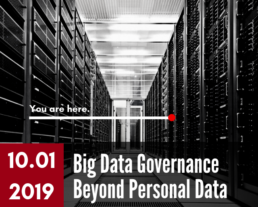
The Era of Mass Data Litigation
The Era of Mass Data Litigation
A new wave of mass litigation has begun all over the world as far as the processing of big data is concerned: many companies operating social networks or providing services through the web are allegedly violating the privacy rights of myriads of people and therefore being named in civil proceedings.
While data breaches may cause limited, if any, damage to a single individual (making them unlikely to bring individual claims), aggrieved groups affected by the breach may seek compensation for the aggregate damage via class actions. Recently Mr. Schrems, a young Austrian activist and lawyer, brought an action before the Regional Civil Court of Vienna against Facebook Ireland Limited, alleging that the defendant had committed numerous infringements of data protection provisions and seeking compensation for the damages suffered by him and thousands of other Facebook users. In addition to this lawsuit, similar proceedings against Facebook, Whatsapp, Instagram, and Google have been commenced in France, Belgium, Germany and also in Italy.
In the United States, Facebook Inc. and the political consulting firm Cambridge Analytica have been sued for obtaining information from 50 million of the social media company’s users without permission. Facebook is also facing a class action in the Northern District of California for other alleged misconduct including unfair and fraudulent business practices, consumer bait-and-switch, and invasion of privacy.
Furthermore, focusing on cryptocurrencies, Mt. Gox, one of the biggest bitcoin exchanges based in Tokio, is facing bankruptcy procedures both in Japan and the United States after the loss of 850,000 bitcoins, valued at more than $450 million at the time, stolen due to a massive hack in 2014. In September 2018 Mt.Gox’s bankruptcy and rehabilitation trustees reported that they had collected more than 617 million dollars, which could be sufficient to reimburse claims completely and invited the investors, in accordance with the Civil Rehabilitation Act of Japan, to file rehabilitation claims. After this announcement the US investors have asked the federal court in California for a stay in the case sued against Mt.Gox until February 28, 2019 in order to get a clear picture over whatever they are going to be compensated in full or partially.
This seminar is an opportunity for lawyers, scholars, and students to discuss, study and reflect on the main procedural issues that have emerged in these cases both with regards to the problems inherent to the aggregate treatment of individual claims and with reference to the new challenges imposed by the processing of massive amounts of personal data in the digital age.
When: 22/03/2019, 10:30/12:30.
Where: DIPARTIMENTO DI DIRITTO PUBBLICO, INTERNAZIONALE E COMUNITARIO Via 8 Febbraio, 2 – 35122 Padova – Aula Valente.
Clicke here to download the poster of The Era of Massa Data Litigation.
![]() Click on the title to download the slideshow presentation:
Click on the title to download the slideshow presentation:
Italian class action litigation – B. Zuffi
The Multidistrict litigation against facebook – L. Ferrarese
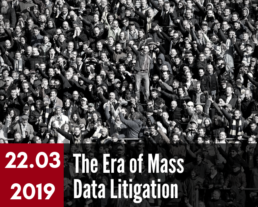
The Rise of Machines and the Disruption of Law
The Rise of Machines and the Disruption of Law
This lecture outlines how machines are coming both to disrupt the legal profession and to change the optimal form of law. The first section describes the relentless growth of computational capacity. The second section maps five areas in which machine intelligence will provide legal services: discovery, legal search, document generation, brief generation, and prediction of case outcomes. The third section shows how these developments will create unprecedented competitive pressures in many areas of lawyering and an unprecedented age of innovation in legal services.
Introduce: Andrea Pin
Speaker: John McGinnis
John O. McGinnis is a graduate of Harvard College and Harvard Law School where he was an editor of the Harvard Law Review. He also has an MA degree from Balliol College, Oxford, in philosophy and theology. Professor McGinnis clerked on the U.S. Court of Appeals for the District of Columbia. From 1987 to 1991, he was deputy assistant attorney general in the Office of Legal Counsel at the Department of Justice. He is the author of Accelerating Democracy: Transforming Government Through Technology (Princeton 2013) and Originalism and the Good Constitution (Harvard 2013) (with M. Rappaport). He is a past winner of the Paul Bator award given by the Federalist Society to an outstanding academic under 40. He has been listed by the United States on the roster of panelists who may be called upon to decide World Trade Organization Disputes.
When: 8/05/2019, 12:30/14:30.
Where: DIPARTIMENTO DI DIRITTO PUBBLICO, INTERNAZIONALE E COMUNITARIO Via 8 Febbraio, 2 – 35122 Padova – Aula Valente.
Clicke here to download the poster of The Rise of Machines and the Disruption of Law.
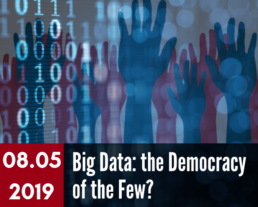
Just Machine Learning in Unjust World?
Just Machine Learning in Unjust World?
Artificial intelligence systems are meant to transcend some of the imperfections of the human mind, being grounded in mathematics and operating on data rather than emotion or subjective perception. But as more algorithms are weaved into daily life, the limits of their objectivity are being revealed. Algorithms can amplify the biases that we have in society.
For example, a ProPublica investigation last year found that a private software used to predict future criminals was biased against black people. In this talk these bias-related problems will be illustrated and will be shown as part of the problem in creating fair algorithms is the concept of fairness itself.
What’s considered fair and precise in the field of computer science may not translate well to justice in the real world. One way to address this problem is by putting computer scientists into conversation with ethicists, philosophers, and others from fields that have historically examined justice and fairness.
Speaker: Tina Eliassi-Rad

5 Reasons Why Social Networks Make Us Vulnerable to Misinformation
5 Reasons Why Social Networks Make Us Vulnerable to Misinformation
As social media become major channels for the diffusion of news and information, it becomes critical to understand how the complex interplay between cognitive, social, and algorithmic biases triggered by our reliance on social networks makes us vulnerable to disinformation. This talk overviews ongoing network analytics, modeling, and machine learning efforts to study the viral spread of misinformation and to develop tools for countering the online manipulation of opinions.
Joint work with collaborators at the Center for Complex Networks and Systems Research (cnets.indiana.edu) and the Indiana University Network Science Institute (iuni.iu.edu). This research is supported in part by the National Science Foundation, McDonnell Foundation, DARPA, Yahoo, and Democracy Fund. Any opinions, findings, and conclusions or recommendations expressed in this material are those of the authors and do not necessarily reflect the views of these funding agencies.
Speaker: Prof. Filippo Menczer, Indiana University.
The seminar will be in AULA B at the Physics and Astronomy Dept., Via Paolotti 9, 35131, Padova.
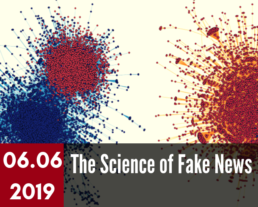
The Digital Economy and the Law
The Digital Economy and the Law
Introductory Speech: Legal Challengesof Digitalization Prof. Claudia Sandei, UNIPD
The disruptive effect of digital technology on Contract Law Prof. Christian Twigg-Flesner, University of Warwick(UK)
The Digital Future of Corporate Law Prof. Florian Möslein, Philipps-UniversitätMarburg(DE)
Asian and Global Trends in Information Technology Law Prof. ShiChen, SWUFE Law School (China)
The seminar will be the 17 June, 16.00 in aula Nievo (in Palazzo Bo – Law Dept., University of Padova)
Main Speaker: Florian Möslein .
Florian Möslein is Professor of Law at the Philipps-University Marburg, where he teaches Contract Law, Company Law and Capital Markets Law. He previously held positions as Professor at the University of Bremen and as Associate Professor at the University of St. Gallen. Born in 1971 in Germany, Florian Möslein graduated from the Faculty of Law of the Ludwig-Maximilians-University of Munich in 1998, after having received the degree “licence en droit” at the University of Paris in 1996. He has also studied business administration and graduated in 1997 with the degree “Diplom-Kaufmann”. Moreover, Florian Möslein holds an LL.M. in International Business Law from the University of London (1999) and a doctorate from the University of Hamburg (2007); he also qualified as a practitioner under German Law (2001, Zweites Staatsexamen).
Codirector of the Institut für das Recht der Digitalisierung (Marburg) and Member of the ELI Digital Law SIG.
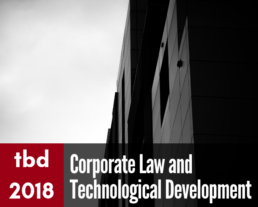
Transparency, Privacy, Big Data: Quo vadis Public Administration?
Transparency, Privacy, Big Data: Quo vadis Public Administration?
When: 5 November 2019, 14.30
Where: Aula Mocenigo Palazzo Bo, Via VIII febbraio 1848, n. 2 Padova
Abstract: In 2006 the Italian Government adopted a Legislative Decree (No. 36/2006) to transpose Directive 2003/98/EC on the re-use of public sector information.
The Directive was the first step of transparency and digitalization policies, which went beyond the aims of the Directive.
Italy adopted therefor two important legislative decrees (in 2009 and 2013) to realize the principle of transparency in our national legal and administrative system. This is pursued through the publication of a countless series of acts and information on institutional websites.
This concept of transparency raises two important issues. First, transparency is with no doubt fundamental for modern democracies, but has to be balanced with other values such as privacy and data protection. Second: increase the accountability of the Public Administration transparency policies could not reduce to mere open
data policy.
Prof. Diana-Urania Galetta
Full professor of Administrative Law and European Administrative Law at the Law Faculty of the University of Milan, where she former taught Administrative Law as an Associate professor. She studied Law and Political Science Law at the University of Milan (both Degrees cum laude). She studied also at the German University of Osnabrück (“Magistra Legum” degree cum laude).
She is Member of the Italian association of Administrative Law Professors (AIPDA), of the German Association of Public Law Professors (VDStRL), of the Societas Juris Publici Europei (SIPE). She is Member of the Steering Committee and Team Leader of WG 4 of the international research group “Network on European Administrative
Procedural Law” (ReNEUAL). She is Member of the Steering Committee of the Franco-German doctoral school on “Legal comparison in Public law in the light of European integration”.
She is Member of the Steering Committee of the “School of Journalism Walter Tobagi”, organized by the Italian Council of the Journalists in agreement with the University of Milan. She participates in the activities of several international research groups: the Dornburg Study Group on the Transformation of Administrative Law in Europe, the international research group Projeto euro-americano “Còdigo modelo de jurisdição administrativa” etc. She is Member of the Steering Committee of the “Rivista italiana di Diritto pubblico comunitario” (Italian Journal of Public EU Law) and of the Committee of Referees for several Law Journals: Diritto, immigrazione e cittadinanza; European Public Law; Foro amministrativo; IUS PUBLICUM Network Review.
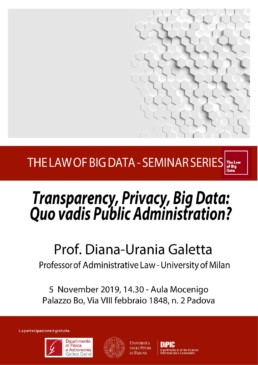
CONCORRENZA, BIG DATA E REGOLAZIONE
CONCORRENZA, BIG DATA E REGOLAZIONE
Incontro con Gabriele Mazzantini per illustrare quali tematiche fondamentali emergano nella pratica dell’Autorità alla luce dei Big Data
Dove e quando: 29 novembre, alle 11;00, in Sala Baldo degli Ubaldi.
ATTENZIONE: A causa dell’inagibilità della sala Baldo, ci raduneremo presso la Sala Lettura presso il Seminario di Diritto Tributario.
Gabriele Mazzantini ha studiato Economia e commercio presso l’Università degli studi di Firenze, ove ha poi conseguito il titolo di dottore di ricerca in Economia e gestione delle imprese e dei sistemi locali. In seguito ha conseguito Master in Management e Politiche delle Pubbliche Amministrazioni presso la Luiss.
Dopo aver lavorato presso l’Istituto Regionale per la Programmazione Economica della Toscana, è stato funzionario presso l’Autorità Garante della Concorrenza e del Mercato, prima impiegandosi presso l’Ufficio di Gabinetto dell’Autorità, poi presso l’Ufficio del Segretario Generale, infine presso il Comitato per le Valutazioni Economiche. Per cinque anni è stato capo segreteria e assistente di un giudice della Corte costituzionale. Da novembre 2016 lavora come funzionario presso la Direzioni Studi e Analisi della Legislazione dell’Autorità Garante della Concorrenza e del Mercato. Collabora inoltre con l’Osservatorio sulle esternalizzazioni e con l’Osservatorio sull’AIR, istituiti presso l’Istituto di Ricerche sulla Pubblica Amministrazione.
Ha al suo attivo diverse pubblicazioni in tema di concorrenza, di regolazione dei mercati e di servizi pubblici.
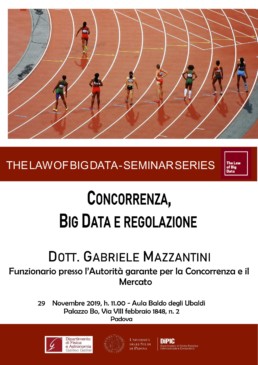
The Law of Big Data Workshop
The Law of Big Data Workshop
As the conclusion of this year project, we will organize an Interdisciplinary Workshop in order to discuss what we have learned from the Law of Big Data seminar cycles and which future perspectives and collaborations the project developed and open. We will also launch the new and related project: AI, Innovation and Society.
